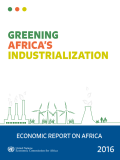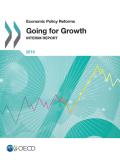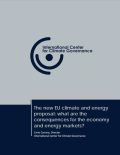
This policy brief looks at the features of structural transformation and its desired outcomes in relation to an inclusive green economy, as well as the transmission mechanisms that could reinforce expected contributions and ensure the sustainability of the transformation. It takes a closer look at the macroeconomic policy landscape of the African continent and provides implementation experiences and summarises good practices on inclusive green economy policies.
The French version of the policy brief is available here.
This policy brief outlines the role and significance of various enablers that could facilitate a smooth transition to green economy in Africa, taking into account the implications for the region and highlights key messages that could inform the application of enabling measures in Africa for optimal policy impacts. It concludes that the transition to a green economy will not happen automatically; and creating certain ‘enabling’ conditions will provide incentives for various stakeholders, including public and private actors, to invest in, and contribute to building an inclusive green economy.
The French version of the policy brief can be found here.

Going for Growth is the OECD’s regular report on structural reforms in policy areas that have been identified as priorities to boost incomes in OECD and selected non-OECD countries (Brazil, China, Colombia, India, Indonesia, Latvia, Russian Federation and South Africa). Policy priorities are updated every two years and presented in a full report, which includes individual country notes with detailed policy recommendations to address the priorities.The next full report will be published in 2017.
This interim report takes stock of the actions taken by governments over the past two years in the policy areas identified as priorities for growth. This stocktaking is supported by internationally comparable indicators that enable countries to assess their economic performance and structural policies in a wide range of areas.

In 2016, the European Council approved the new climate and energy targets that would lead the EU action through to 2030. While these policies mark progress towards the EU’s long-term decarbonization objective, there are some contradictions to consider. Most notably, although the 20-20-20 package was in place, in the last few years the energy mix of some EU countries showed an increased reliance on fossil fuels. In addition, total emissions in Europe declined, but mainly because the economic crisis reduced energy demand in many EU Member States. The new European framework therefore comes at a critical time particularly because the 2030 policy commitments should be able to cope with this contradictions and actually promote investment into low-carbon sources. The article will explore these issues by discussing what would be the consequences of these targets into the energy market.
